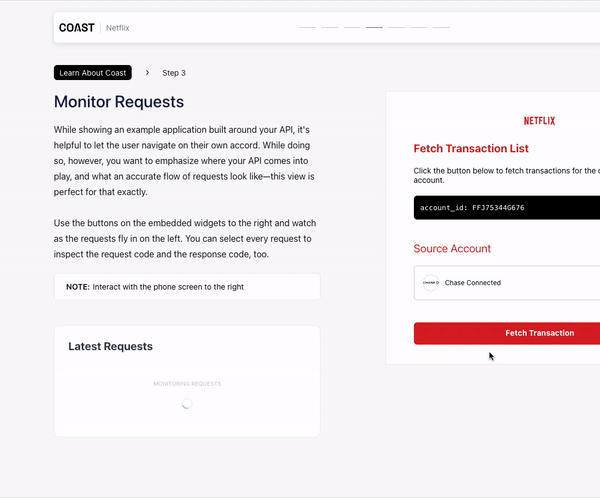Spencer Levitt and Austin Pager met early on as classmates at Northwestern University and spent the next several years building apps powered by a wide range of APIs. After developers kept tapping them to help with API integrations, they set out to build a tool for “API-first” companies to offer simpler integration experiences.
“During Y Combinator, which we participated in after graduating from Northwestern a year early, an early adopter started using our tool to aid their sales process instead,” Levitt and Pager told TechCrunch via email. “He realized it was a great way to explain the value of his software to potential buyers. This was our ‘aha’ moment.”
Levitt and Pager co-founded Coast, a platform that enables a sales team to demo its company’s APIs via a dashboard that executes live requests visually and in the browser. Using Coast, sales teams can showcase what prospects can build on top of APIs — personalized to a given prospect’s brand and use case.
Certainly, there’s other software demoing platforms on the market — many with substantial VC backing. Demostack, a startup developing a service that lets SaaS companies quickly create product demos, raised $34 million last April. Meanwhile, Consensus, a company developing an automation platform for SaaS product demos, recently nabbed $110 million. Other noteworthy vendors include Arcade, Demodesk and CloudShare.

But Coast is unlike most other demoing tools because it doesn’t depend on a front end. Instead, it generates UIs from lines of code, using a company’s publicly accessible or sandbox APIs to create an interactive customer experience.
“The API-first space is growing fast, but the tools that enable their sales teams haven’t kept up,” Levitt and Pager said. “Coast [helps by] auto-generating visual interfaces that are pre-configured to the API based on the underlying technical specifications. [Salespeople] use Coast to provide bespoke and interactive demos throughout the sales cycle: for outbound, live demos, follow-ups and even into implementation.”
Coast’s emergence comes at a time when APIs are growing in importance to software companies, revenue-wise — particularly those in the enterprise. According to a survey from RapidAPI, close to 65% of developers reported relying more on APIs in 2022 than in 2021. And these APIs are being monetized somewhat aggressively. The same survey found that there’s been a 16% increase in the rate of APIs being commercialized in the financial sector alone.
In a separate poll from Forrester, commissioned by API management company Axway, 72% of respondents — all business decision-makers — said that they believed increasing API adoption could lead to a roughly 26.4% increase in their digital business growth.
“We’ve found that C-suite-level managers are always looking for a better way to show off the power of their software. Executives also care about making sure their customer-facing teams are empowered with the best resources when speaking with partners,” Levitt and Pager said. “With Coast, we help put the technical skills into the hands of customer-facing teams on the frontlines to easily show off the power of their APIs without needing additional engineering support.”
Coast claims to have early uptake from customers, including Unit, Finch, Oso, Sardine, Column Tax and Enode. It’s raised $2.1 million in seed funding so far from Y Combinator, Liquid2 Ventures, GTMfund and Brickyard, as well as individual investors such as Dropbox co-founder Arash Ferdowsi and Segment co-founder Calvin French-Owen.
“Coast is solving a major, timely problem for both API sellers and buyers,” Ferdowsi said in a decidedly complimentary email. “I was able to see the need firsthand at Dropbox. Buying an API touched many parts of the organization, and effectively bringing an API to market is expensive and challenging. Coast is attacking a market that is growing rapidly with novel software that elegantly demonstrates the power of an API.”































Comment